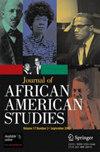“Soul!” (Famous!) TV Program with Ellis Haizlip
IF 0.8
Q3 ETHNIC STUDIES
引用次数: 0
Abstract
Soul! was a publicly funded cultural affairs television program that aired for five seasons on Public Broadcasting Service affiliates in the United States from 1968 to 1973. Its first season aired on New York public television, and after that it was distributed nationally via the Public Broadcasting Service. A showcase for Black arts, culture, and politics, Soul! was closely associated with the producer and host Ellis Haizlip, a Black gay man, who emphasized a vision of “soul” culture that was eclectic, inclusive, and aligned with the radical political energies of the Black Power movement. Soul! provided a powerful platform for Black musicians and other artists and public figures at a time when their access to national TV was severely constrained. It also employed Black women in significant on- and off-camera roles and helped vault the poet Nikki Giovanni to national prominence. Filmed live in a small New York studio, Soul! included an in-studio audience within its representational frame, giving viewers an opportunity to see audiences reacting to guests. These guests ranged from the gospel singer Marion Williams to the soul singer Al Green; from the dancer George Faison to the spoken-word group The Last Poets; and from the activist and entertainer Harry Belafonte to Black Panthers leader Kathleen Cleaver. Other notable Soul! guests included Nation of Islam leader Louis Farrakhan, writer and activist James Baldwin, singer-actor Novella Nelson, and musicians including Labelle, Earth, Wind and Fire, Rahsaan Roland Kirk, Horace Silver, Gladys Knight and the Pips, and Valerie Ashford and Nick Simpson. As a Black-produced TV show aimed explicitly at Black audiences, Soul!’s trajectory was always precarious. Early funding for the show came from New York public broadcasting and the Ford Foundation, liberal institutions eager to support Black media in the wake of uprisings following Dr. Martin Luther King Jr.’s assassination. However, backlash to the Black Power movement—as represented by the election of “law and order” candidate Richard Nixon in the 1968 presidential election—translated into attempts to silence Black public media. Despite evidence that it resonated powerfully with Black viewers, the show was cancelled in 1973. Soul! inspired innumerable writers, performers, and technicians to seek opportunities in television. It set a mark for television that sought to entertain and educate, keeping an eye on diversity within the Black collective.“灵魂!”(著名的!)Ellis Haizlip的电视节目
的灵魂!是一个公共资助的文化事务电视节目,从1968年到1973年在美国公共广播公司的分支机构播出了五季。它的第一季在纽约公共电视台播出,之后通过公共广播服务在全国范围内播出。黑人艺术、文化和政治的展示,灵魂!与制作人兼主持人埃利斯·海兹利普(Ellis Haizlip)关系密切。海兹利普是一名黑人同性恋,他强调一种“灵魂”文化的愿景,这种文化是折衷的、包容的,并与黑人权力运动的激进政治能量相一致。的灵魂!为黑人音乐家、其他艺术家和公众人物提供了一个强大的平台,当时他们进入国家电视台的机会受到严重限制。它还聘请黑人女性在镜头内外扮演重要角色,并帮助诗人尼基·乔瓦尼(Nikki Giovanni)成为全国知名人物。在纽约的一个小工作室现场拍摄,《灵魂!》在其代表性框架内包括一个演播室内的观众,让观众有机会看到观众对客人的反应。这些嘉宾包括福音歌手马里昂·威廉姆斯(Marion Williams)和灵魂歌手艾尔·格林(Al Green);从舞蹈家乔治·费森到口语组合“最后的诗人”;从活动家和艺人哈里·贝拉方特到黑豹党领袖凯瑟琳·克利弗。另一个值得注意的灵魂!嘉宾包括“伊斯兰民族”领袖路易斯·法拉肯、作家兼活动家詹姆斯·鲍德温、歌手兼演员诺维拉·尼尔森,以及包括拉贝尔、地球、风与火、拉桑·罗兰·柯克、贺拉斯·西尔弗、格拉迪斯·奈特和皮普、瓦莱丽·阿什福德和尼克·辛普森在内的音乐家。作为一部黑人制作的电视节目,《灵魂!》他的轨迹总是不稳定的。该剧的早期资金来自纽约公共广播公司和福特基金会(Ford Foundation),这两个自由机构在马丁·路德·金(Martin Luther King Jr.)博士被暗杀后的起义之后,急于支持黑人媒体。然而,对黑人权力运动的抵制——以“法律与秩序”候选人理查德·尼克松在1968年总统选举中当选为代表——转化为试图让黑人公共媒体沉默。尽管有证据表明它与黑人观众产生了强烈的共鸣,但这部剧还是在1973年被取消了。的灵魂!激励了无数作家、演员和技术人员在电视领域寻找机会。它为寻求娱乐和教育,关注黑人群体内部多样性的电视节目树立了一个标志。
本文章由计算机程序翻译,如有差异,请以英文原文为准。
求助全文
约1分钟内获得全文
求助全文
来源期刊

Journal of African American Studies
ETHNIC STUDIES-
CiteScore
0.80
自引率
0.00%
发文量
30
期刊介绍:
The Journal of African American Studies publishes original research on topics of professional and disciplinary concern for the social progress of people of African descent. This includes subjects concerning social transformations that impact the life chances of continental Africans and the African diaspora. Papers may be empirical, methodological, or theoretical; including literary criticism. In addition to original research, the journal publishes book reviews, commentaries, research notes, and occasional special thematic issues. African American Studies is an interdisciplinary field; diverse disciplinary methods and perspectives that include anthropology, art, economics, law, literature, management science, political science, psychology, sociology, social policy research, and others are appreciated.
 求助内容:
求助内容: 应助结果提醒方式:
应助结果提醒方式:


